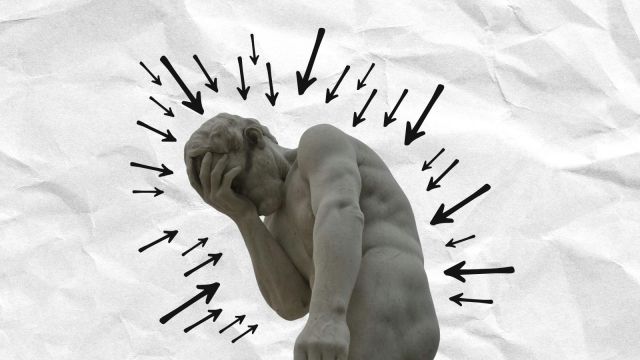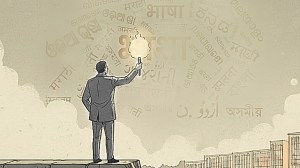The moment the volunteers at Samay Raina’s show sealed my mobile phone into a small, black pouch, an unexpected burst of resentment flared inside me. I immediately snitched about it to my friends. This was the first true comedic irony of the night. A room full of people forbidden from documenting the very enjoyment they were about to experience. But that anger left me exhausted and made me think: why on earth did I feel such anxiety about being unable to use my phone while it was in my hand?
The truth is my back hurt from the cramped seats, the air was thick and suffocating, and halfway through the set — which was funny here and there but not rib-tickling — I just wanted to leave. Yet, even without the ability to post, my mind was running through captions for post-show photos that I had anticipated.

And that’s when I admitted to myself that this constant need to be ‘on’, this fear of having a moment that wasn’t captured, was proof that everything has become performative. We don’t just attend shows, concerts, or vacations anymore, but perform them. It feels like every moment in our lives is now being curated with strategy, what the internet calls “doing things just for the plot.”
This is performance culture. Some call it curation. Either way, it’s exhausting, and the physical toll of losing focus while sitting in that arena for nearly two hours was the wake-up call I needed. “Performance culture is the invisible pressure to ‘be seen’ as successful, happy, or productive rather than simply being. It’s when our worth starts depending on how we are perceived, not how we actually feel,” said mental health expert Arouba Kabir.
As a millennial who grew up alongside the rise of social media, I realised that almost every action now comes with an invisible audience. Even when I’m alone, I find myself thinking in captions. The performance starts before the moment even happens, planning what to wear, not repeating my outfits, which corner of the cafe has good lighting, and how this moment might look on my feed.
I am clearly not alone in this. Scroll through any feed and you will see people performing reading (#CurrentlyReading), feminism (unlearning), romance (#CoupleGoals), and even leisure (slow-mornings). We live in a world where doing things isn’t enough, but you have to be seen doing them. It’s a strange kind of validation economy where likes and comments are our new form of applause. The social currency of visibility has completely replaced the quiet, deep satisfaction of just living.
“It (performance culture) overlaps with social currency, which is the value we believe we gain from likes, followers, and visibility. Both operate on the same principle: the more you show, the more you’re worth. But the cost is often authenticity and peace,” Kabir added.
Story continues below this ad
What makes this dynamic even more absurd is how we package all this performance under the label of authenticity. We post blurry selfies and caption them “no filter,” as if that single action makes us authentic. We share “vulnerable” posts about burnout, carefully worded, emotionally curated confessions to sound spontaneous and relatable.
There’s nothing wrong with sharing our lives, but when every emotion becomes “content”, it stops being a genuine feeling and starts being a performance. I have caught myself doing this, too. Even if I am sad, part of me is already deciding on whether I should post about it. It’s unsettling how easily the instinct to feel turns into the instinct to show.
Or take joy. We don’t celebrate quietly; we announce it on social media, hoping others see it and confirm that our happiness looks valid. The digital applause makes it feel more real. But the irony is the more connected we are, the lonelier we feel, because behind every “so happy for you” comment is someone quietly wondering why their own life doesn’t look that happy.
“Fear. Fear of being irrelevant, unnoticed, or ordinary. Many people grew up equating love with performance: ‘I am valued when I achieve, when I impress, when I please.’ Social media amplifies that old emotional script. Curation becomes a survival mechanism. ‘If I show the best version of me, maybe I’ll be safe, loved, or accepted,’” Kabir emphasised.
Story continues below this ad
That night at the Samay Raina show, struggling with discomfort, I realised the toll isn’t just mental but also physical. The act of performing our enjoyment takes massive energy. We are constantly alert, smiling for stories, pretending to laugh harder for that perfect candid moment.
When I finally got home that night, I felt completely drained, not just from the show but from the performance of being there, being a part of the herd I never wanted to join, and watching the kind of comedy I don’t necessarily like. This constant exposure, or even the anticipation of it, keeps us in a state of stress. It’s the same cortisol that spikes during public speaking, only now it’s spiking every day, every post, every update.
“When your identity depends on constant output and approval, rest feels like failure. You’re always “on,” always comparing, always doubting whether you’re enough. Over time, this leads to performance anxiety, emotional exhaustion, and a deep disconnect from your real self, the perfect breeding ground for imposter syndrome,” Kabir explained.
“Over time, people start internalising their online persona. They lose track of what’s real, what they actually enjoy, what they believe, and what they look like unfiltered. This creates a subtle identity crisis: “Who am I when I’m not being watched?” she added.
Story continues below this ad
Of course, the obvious way to fix this is to just log off. But that’s easier said than done. In today’s world, invisibility comes with a price. If you’re not posting, people assume you’re inactive, obsolete, maybe even unhappy. So we keep posting, smiling, tagging, bombarding friends with reels, and pretending. Because the disappearance or silence feels like social suicide.
Lately, I have been actively trying to unlearn this need to perform. To go somewhere and not take a picture. To read without announcing it. It’s harder than I thought. The instinct to document runs deep. But sometimes, I manage. Most of the time, I fail miserably.
“Validation isn’t the enemy, dependency is. We are social animals and we need validation but not so much. It’s okay to enjoy being seen. The problem begins when you need to be seen to feel real. Start by shifting from “I post to be liked” to “I post because this matters to me.” Healthy validation is when external appreciation feels like a bonus not a lifeline,” Kabir said, noting how to build a healthy relationship with validation on social media.
I am still figuring out how to live without performing, how to post less and feel more. But I am trying. Because maybe the real rebellion for our generation isn’t deleting social media, but living like no one’s watching.

































